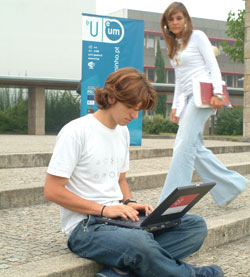

Home  Education and Training
Education and Training

 Education and Training
Education and Training Education and Training

According to the Connecting Portugal programme, the Education and Training projects are aimed at modernising and opening up the school environment, training and developing competences, namely by ensuring:
- Inclusion of ICT throughout the education system with the objective being to improve the quality of young people’s education, motivation and pleasure from learning and the technological competences that are essential for the modern labour market.
- Harnessing the motivational power of ICT to get young people who have left school re-involved in learning.
- Recognising and accrediting acquired competences.
- Extending training to new audiences, ensuring that all citizens can gain competences in using ITC services.
The following are examples of outputs and actions to be achieved:
- Multiplying the number of computers in schools so that there is an average of one computer to 5 students by 2010.
- Encouraging computer use at home by students, namely via the following mechanisms:
- Halving the costs of purchasing computers for families with students and who are not high income earners via a 250€ tax break.
- Promoting progressive availability of computers for the most deprived students via school social action services.
- Spreading ICT use to all teachers from all subject areas.
- Providing virtual working environments for students, support documents in electronic format and monitoring systems for students by parents and teachers, as well as systematic participation in network collaboration projects with external bodies.
- Promoting the generalisation of the individual electronic portfolio for students finishing compulsory education, where all their most relevant work will be recorded, proof of their practical experience in different areas (artistic, scientific, technological, sport and others) will be given and their effective use of ICT in the different academic subjects will be demonstrated.
- Stimulating the development of new education content based on multimedia technologies at all levels of the education system (primary, secondary and higher education) to improve the quality of young people’s education, motivation and pleasure of learning and the technological competences that are essential for the modern labour market.
- Stimulating the development of an “open encyclopaedia”, encouraging student participation throughout the country in producing and posting content in Portuguese in all subject areas and levels of education, with the help of their teachers.
- Stimulating collaborative work between different subject areas and schools at all levels in the education system (primary, secondary and higher education).
- Increasing the number of people regularly taking part in education and training schemes in 2010 to at least 13% of the population aged between 25 and 64 (4.8% in 2004).
- Stimulating ICT training, ensuring training for diverse publics according to their needs and aspirations, and making sure that all those participating in basic ICT skills training schemes have an email account.
- Implementing the national ICT skills certification system.
- Promoting the Digital University Network as an integrated way of making available the resources of Portuguese university staff that have resulted from cooperation between universities.
Last updated ( 31/07/2008)
